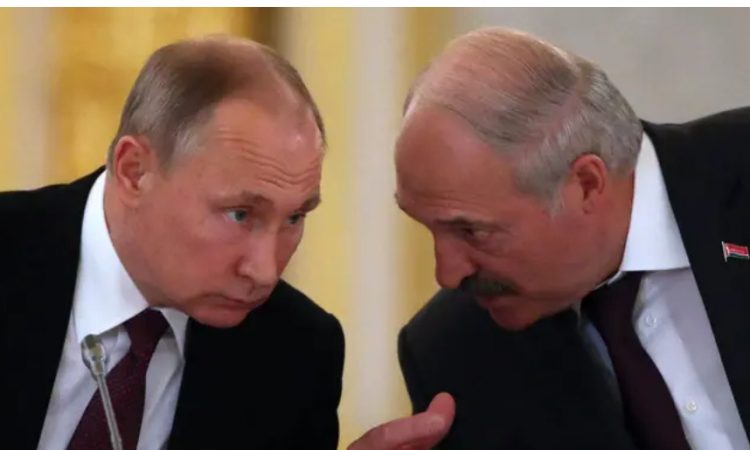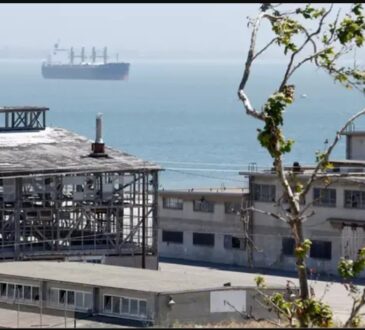
Russian President Vladimir Putin is sending as many as 9,000 servicemen to Belarus, striking fear in Belarusians about possible mobilization.
’
Mikhail Svetlov/Getty Images
Russia is sending as many as 9,000 servicemen and hundreds of armored vehicles to Belarus, the Belarusian Defense Ministry said Monday. According to the ministry, Belarusian forces are set to conduct live fire exercises and anti-aircraft guided missile launches with the Russians.
It is the latest sign that Belarus, which Russian President Vladimir Putin has used as a staging ground for the war in Ukraine, may be preparing its armed forces for more action.
Belarusian leader Alexander Lukashenko said earlier this month he agreed with Putin that there should be a joint regional group of troops “in connection with the aggravation on the western borders of the Union State,” referring to the “union state” between Russia and Belarus that fuses the countries’ militaries, banking, and other sectors.
According to a briefing with military attaches, Russia will send Belarus approximately “170 tanks, up to 200 armored combat vehicles, and up to 100 guns and mortars with a caliber of more than 100 mm,” the head of the Department of International Military Cooperation of the Ministry of Defense Belarus, Valery Revenko, said.
Aviation components and troops have already begun to arrive, Revenko said. Belarus’ Armed Forces have also undergone a “sudden inspection of the combat readiness” this month, he added.
The exercises come as Ukraine warns that Belarus may make an attempt to attack Ukraine from the north, Ukraine Security Service (SBU) Colonel Roman Kostenko said earlier this month.
Belarus has long been supportive of Russia’s war in Ukraine, serving as the launching pad for Russia’s effort to seize Kyiv early this year. Although the offensive failed, Belarus has been ginning up its military in light of the war for months. In June, Belarus announced the creation of a people’s militia, a new military unit on the southern border with Ukraine, and drills.
Lukashenko has in recent weeks accused other European countries of acting “provocatively” and has also zeroed in on Poland—threatening a forceful response if anything goes awry on its border with the country.
At the same time, the Belarusian president has made calls for peace, suggesting that he is against war, even while allowing Putin to use Belarus for his war plans. Belarus’ Ministry of Defense has claimed that proposals of peace have not been accepted, forcing Belarus to resort to deployment.
“In the current conditions of the military-political situation, most of the proposals of the MoD of Belarus on the need for dialogue and de-escalation of tension under various pretexts were not accepted. Result is the deployment,” Revenko said.
Putin is probably working to lean on Lukashenko after a series of losses in Ukraine, Kenneth Yalowitz, a former U.S. ambassador to Belarus, told The Daily Beast.
“Putin is probably pressing him very strongly,” Yalowitz said.
Putin may be hoping that if Belarus appears to be building up for potential deployment, Ukraine will have to divert some resources to defend against a potential northern incursion, taking focus away from the fight against the Russians in the south and giving the Russians an edge.
“By developing this force on the border between Belarus and Ukraine… what Putin is driving at is to force, you know, Ukrainian forces, to defend that part of the border,” Yalowitz told The Daily Beast. “This is more of psychological warfare… to show that Putin is not defenseless, but that he still has options… even though the war is going poorly.”
Belarusian Defense Minister Viktor Khrenin expanded on the Belarusian and Russian grouping in a meeting at a tractor factory on Monday, noting that Belarus is practicing for deployment.
“ You just need to not go to the military office and hide the children. ”
The grouping includes “command and control bodies of various levels” as well as army units and support units, according to Khrenin.
“We have practiced various options for deploying and using the regional force grouping,” Khrenin said. “We have practiced deploying all the systems in the face of an obvious threat and the gradual deployment in accordance with the situation. Taking into account the evolving situation, we are gradually implementing individual measures meant to prepare the regional force grouping for responding to emerging challenges and threats.”
The influx of Russian forces into Belarus is stirring rumors of mobilization and striking fear throughout the country, as the domestic population is unlikely to support a broad mobilization. One Belarusian mother, who spoke with RFERL under a pseudonym to protect her safety, said she has instructed her son, who is deployed near the Ukrainian border, to run.
“You just need to not go to the military office and hide the children,” the mother said, “so they’re not going to fight for other people’s interests.”
Others are examining ways to avoid conscription should Lukashenko order a broader mobilization, especially after Belarusian lawmakers have been eyeing canceling draft deferments for students studying abroad.
Belarusian opposition leader Sviatlana Tsikhanouskaya has warned that if Lukashenko moves forward with a mobilization, he would face significant domestic pushback.
Lukashenko has worked to toe the line, and has sworn that his involvement in the conflict is just to help Russians and Ukrainians and that he does not intend for Belarus to get involved in the war directly.
The Belarusian Defense Minister echoed his stance, claiming that the group exercises were only about defense, not offense.
“We are not going to attack anyone. I’d like to emphasize once again that this force grouping is supposed to carry out purely defensive tasks,” Khrenin said, adding that it was meant to be an “adequate response” to what is going on on Belarusian borders.




